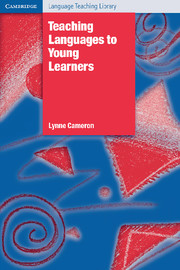Book contents
- Frontmatter
- Contents
- Preface
- Acknowledgements
- 1 Children learning a foreign language
- 2 Learning language through tasks and activities
- 3 Learning the spoken language
- 4 Learning words
- 5 Learning grammar
- 6 Learning literacy skills
- 7 Learning through stories
- 8 Theme-based teaching and learning
- 9 Language choice and language learning
- 10 Assessment and language learning
- 11 Issues around teaching children a foreign language
- References
- Index
4 - Learning words
Published online by Cambridge University Press: 05 May 2010
- Frontmatter
- Contents
- Preface
- Acknowledgements
- 1 Children learning a foreign language
- 2 Learning language through tasks and activities
- 3 Learning the spoken language
- 4 Learning words
- 5 Learning grammar
- 6 Learning literacy skills
- 7 Learning through stories
- 8 Theme-based teaching and learning
- 9 Language choice and language learning
- 10 Assessment and language learning
- 11 Issues around teaching children a foreign language
- References
- Index
Summary
Introduction
The previous chapter was concerned with children using the foreign language as discourse in the classroom and how such use might work to promote learning. This chapter deals with the development of vocabulary as a language resource.
Building up a useful vocabulary is central to the learning of a foreign language at primary level. While opinions differ as to how much grammar of the foreign language can be taught, children are clearly capable of learning foreign language words through participating in the discourse of classroom activities. Vocabulary has moved to centre stage in foreign language teaching in recent years, backed by substantial and increasing research (e.g. Carter and McCarthy 1988; Coady and Huckin 1997; Schmitt and Meara 1997; Singleton 1999; Read 2000). Alongside the growing importance of vocabulary, there are fascinating and, I suspect, very significant, changes taking place in how we think about the relative nature and roles of vocabulary and grammar. The more we find out about how words work in language and how vocabulary is learnt, stored and used, the more difficult it becomes to uphold the traditional split between vocabulary and grammar. Much important grammatical information is tied into words, and learning words can take students a long way into grammar. This suggests that if we give a high priority to vocabulary development, we are not thereby abandoning grammar. Rather, vocabulary learning can serve as a stepping stone to learning and using grammar. The interrelation of vocabulary and grammar in language learning will be taken further in the next chapter.
- Type
- Chapter
- Information
- Teaching Languages to Young Learners , pp. 72 - 95Publisher: Cambridge University PressPrint publication year: 2001

